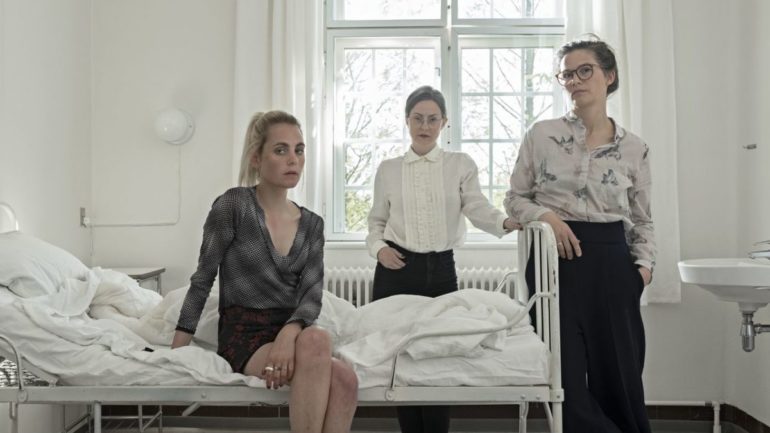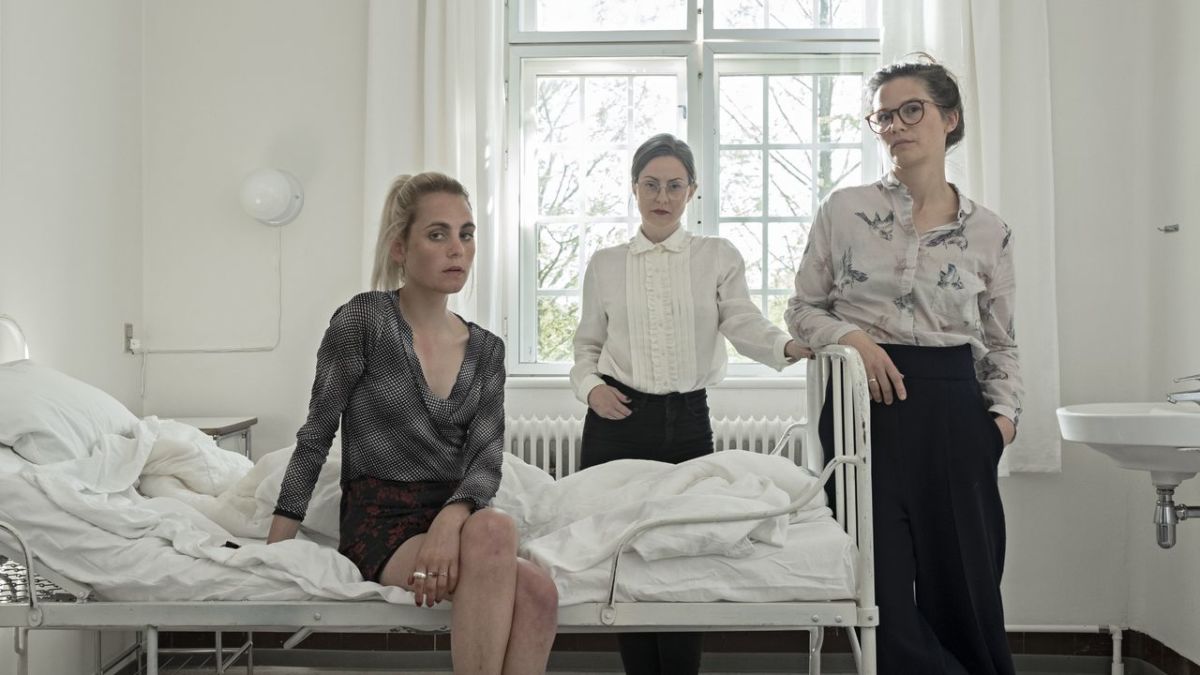An eerie study of mental breakdown that blurs the boundaries between reality and projection, Psychosia is a confident chamber drama from Danish director Marie Grahtø Sørensen that suggests that the line between sanity and insanity is almost razor-thin. While at times reaching too far with outlandish and provocative imagery when simplicity would have sufficed, it marks a cerebral and strange debut feature from Sørensen that rewards close attention and perhaps multiple viewings.
Viktoria (Lisa Carlehed) is a researcher of suicide, invited to treat the young patient Jenny (Victoria Carmen Sonne), who has been in and out of the clinic from a young age. She has been invited by clinic manager Dr Klein, expertly played by Danish veteran Trine Dryholm. Viktoria has little experience dealing with patients on the ground, yet Klein seems to trust her instincts, watching from afar as the two women grow closer in intimacy.
At first the two women seem like complete polar opposites, Viktoria’s buttoned up shirt strikingly contrasted by Jenny’s loose collar. Additionally, while Viktoria is loath to betray her true emotions, Jenny is upfront about her fears of dying and her lack of control in a terrifying world. Meanwhile, Dr Klein’s large eyes never betray her sentiment, giving her something of a creepy and controlling demeanour. What exactly is her aim here? To help Jenny break out of her suicidal fantasies, or something far more complex?
Ingmar Bergman’s Persona is an obvious inspiration here, Grahtø even reusing that film’s iconic double close-up. Like in Bergman’s classic, the blurring between the two women is a slow process, impossible to pin-point at any one moment. Pay heed to the opening lines: “Energy. A human is made of energy. Energy is divided into two circuits. A circuit of the ideal and a circuit of desire. These two circuits struggle against each other.” While in a lesser film this narration may spell out the entire meaning of a work before it has even begun, its final thesis comes across as something far knottier and more interesting than that, an examination of mental and physical boundaries that keeps questioning itself right until the final frame.
Mental fixations are explored here as self-perpetuating traps, dooming characters to constantly repeat themselves. Repetition and routine is seen as both a way to control a world we don’t understand and a means to lock ourselves into our own blinkered view of life. Shots through windows and hallways are often blurred; suggesting that we all look through a mirror, darkly, and are deeply afraid of what we might see. Constantly complicating its own narrative through jarring jumps and non-linear editing, Psychosia invites the viewer to become an active participant in its quixotic search for meaning.
A predominantly female-focused tale (there are no major speaking roles for men in this film), Psychosia uses its limited setting to its advantage. Sørensen utilises a variety of tricks to replicate the mental state of her characters. The use of reverse shot is particularly innovative here, coming at the same characters from different angles to suggest a perspective that is constantly off-balance. The audience is required to do a lot of the legwork, inferring what is real and what is imagined, and, more importantly, who is doing the imagining at any given time. Yet there are times when Sørensen overplays her hands, with a few blood-splattered images inserted to shock while adding little of value, especially as Psychosia works best through its subtle manipulations of editing and mise-en-scène.
We are given much time to ponder on what these characters are thinking. This is a film of faces, the camera lingering on the smallest of expressions way past conventional runtimes. Lisa Carlehed is particularly good here, moving between composure and skittishness with ease, often within the same shot. Victoria Carmen Sonne is equally game as the compulsive Jenny, the two women expertly playing against each other in a game of mental cat and mouse. Above it all is the authoritative Trine Dryholm, saying so much with her eyes while hardly talking at all.
The final denouement satisfyingly clears the table, allowing us to finally see what was perhaps already fairly obvious. It’s a highly invigorating way to end the tale, showing that the confusion in directing and editing was the point all along, making me want to see it all over again to catch what I missed.
Psychosia debuted in competition at the Venice International Film Festival as part of the 34th Venice International Film Critics Week on the 4th September.
Some of the coverage you find on Cultured Vultures contains affiliate links, which provide us with small commissions based on purchases made from visiting our site.


